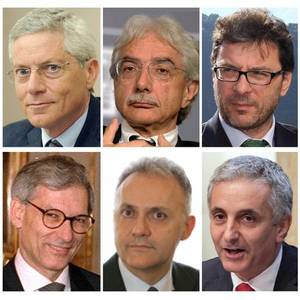Election of a new president remained a will o' the wisp on Day Two of the vote. At 7 pm the joint parliamentary session was suspended after Romano Prodi received only 395 votes - 109 fewer than necessary to be elected to succeed Giorgio Napolitano. Behind Prodi was Stefano Rodota' with 214 votes and, farther in the distance, Anna Maria Cancellieri, who has been serving as Interior Minister under the emergency government of Mario Monti (78 votes), followed distantly by Massimo D'Alema (15). Tomorrow a new vote takes place, but at this point, no one is making any guesses as to the outcome save that new national general elections remain a serious risk, and an expensive prospect.
You chose: bersani
-
-
Right and left in Italy agree on the gravity of the problem. "The house is on fire," thundered Angelino Alfano, titular secretary of the rightist Freedom Party (PdL). "Italy is starting to be frightened - yes, frightened," intoned the moderate leftist professor Ernesto Galli della Loggia, writing in Corriere della Sera. Both lament the politicians' failure to move toward formation of a new government. But there agreement ends, and the impasse over what to do to avoid a dangerous power vacuum continues. Fighting to gain time as the end of his mandate approaches, President Giorgio Napolitano has appointed a 10-man committee of "sages" to try to excogitate points of convergence on reforms.
-
One month after Italy's national general elections, Pier Luigi Bersani, leader of the Partito Democratico (PD), is trudging up a political Mount Everest whose peak hides, invisible, in the clouds. When President Giorgio Napolitano tapped him last week to begin testing the ground for creation of a new government, in essence Bersani was asked to resolve the three-way split that pits his PD against both the rightist Liberty Party (PdL) of former Premier Silvio Berlusconi and the forces of self-righteous, angry Beppe Grillo. Can that three-way split be resolved? These are crucial questions as the vote for the the presidency looms a few scant weeks away.
-
Workaday Milan was thrown into a small tizzy Wednesday morning when a hundred or so mostly middle-aged men and women blocked the sidewalk in front of the city courthouse and began to sing the Italian national anthem, "Fratelli d'Italia." All MPs and senators of former Premier Silvio Berlusconi's Freedom party (PdL), they were protesting what they consider the magistrates' persecution of their maximum leader. This new clash typifies the problems the country is addressing in its gravest political crisis in over a half century.
-
In Italy's most important national general elections in half a century, turnout is expected to be low by the usual standards, but the stakes are extraordinarily high, and begin with the search for finding ways and means to stimulate the economy. And can the pre-election battle lead to a functional coalition?
-
Good grief, the Italian national general elections are only two weeks away, and things are happening so thick and fast that the only way to keep up is with a daily diary of the goings-on.
-
As Leonardo Sciascia once said, it is easy to manage wealth, but hard to manage misery. These are tough times for Italy as elsewhere, and the sight of shops shutting down and factory closures is the elephant in the room of the national general elections just three weeks away. All this is serious enough, but is further aggravated by the daily revelations of the financial shenanigans at the world's oldest bank, the Monte di Paschi (MPS) of Siena, where huge losses were craftily concealed while managers are under investigation for allegedly enriching themselves (the scandals refer to the previous, not the present management, in office just one year).
-
With national general elections plus elections in three key regions less than five weeks away, the campaign has turned more agitated than any in recent history. Behind the obvious nervous tension is the fact that for the past decade of elections to Parliament and the Senate the country was effectively divided into two camps, and the political battle was limited to center right and center left vying for control over the moderate center. By contrast, this campaign, as veteran commentator Sergio Romano points out in the daily Corriere della Sera, has no certainties. "It's a free-for-all, with everybody against everybody else," says Romano.
-
Mario Monti announces his formal entry into politics after 13 months of technical leader of Italy. The outgoing Premier has won the support of the Vatican. However, the polls continue to tell the story. They suggest that Monti has obtained the 20% of the potential electorate for the national general elections slated to take place in late February. Polls also show Silvio Berlusconi (on the right with his troubled Freedom Party (PdL)) at about the same amount while Pier Luigi Bersani (on the left with Partito Democratico) is expected to have at least 35% of vote.
-
At the primaries of the Democratic Party (PD), Pier Luigi Bersani has triumphed, walking away with 63.45% of the votes over his younger rival Matteo Renzi who won only 36.48%. What are the future possible scenarios for the Italian politic?







































